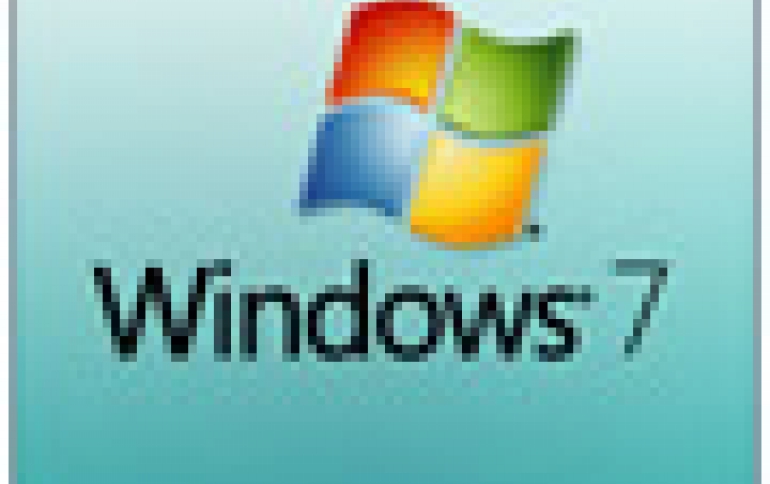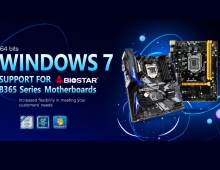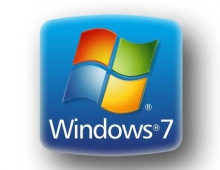
Half Of All Windows 7 PCs Are Running 64-bit
As of June 2010, we see that 46% of all PCs worldwide
running Windows 7 are running a 64-bit edition of Windows 7,
according to Microsoft's data.
That is, nearly half of all PCs running Windows 7 are
running 64-bit. Compared to Windows Vista at 3 and a half
years after launch, only 11% of PCs running Windows Vista
worldwide are running 64-bit. With Windows 7, running a
64-bit OS is becoming the norm.
A primary benefit of 64-bit Windows is the increase in addressable memory. This makes more "bits" available to Windows (the OS), which means more information can be "addressed" at once. 32-bit architectures have a memory ceiling of 4GB while the 64-bit architecture increases the memory ceiling to approximately 17.2 billion GB or RAM. Windows 7 is designed to use up to 192 GB of RAM, a huge jump compared to limits with all 32-bit systems.
Essentially, 64-bit Windows allows your PC to take advantage of more memory to do more things. If you are running tons of apps, you can see a real difference in performance. Aside from the performance gains, there are also security enhancements and support for virtualization as well.
The reason for the jump in transition to 64-bit PCs can be attributed to a few things. The first is the price of memory has dropped over the last several years making it easier for OEMs to up the amount of memory in the PCs they ship. And most major processors in PCs today are capable of running a 64-bit OS. There are also more and more compatible devices and applications for PCs running 64-bit Windows 7.
Microsoft's OEMs today have also fully embraced 64-bit. According to Stephen Baker at NPD, 77% of PCs sold at retail in April 2010 in the U.S. had a 64-bit edition of Windows 7 pre-installed.
And businesses are adopting Windows 7 64-bit as well. According to Gartner, by 2014 75% of all business PCs will be running a 64-bit edition of Windows. Intel also recently migrated to 64-bit Windows 7.
To find out what?s compatible with 64-bit Windows 7, you can visit the Windows 7 Compatibility Center where you easily check 64-bit compatibility on thousands of devices and applications and get 64-bit driver and software downloads.
In addition, to find out if your PC can run a 64-bit edition of Windows 7, you can run the Windows 7 Upgrade Advisor. If your PC isn?t currently capable of running a 64-bit edition of Windows 7, the Windows 7 Upgrade Advisor will let you know if there are any memory upgrades that might be done to move to 64-bit.
A primary benefit of 64-bit Windows is the increase in addressable memory. This makes more "bits" available to Windows (the OS), which means more information can be "addressed" at once. 32-bit architectures have a memory ceiling of 4GB while the 64-bit architecture increases the memory ceiling to approximately 17.2 billion GB or RAM. Windows 7 is designed to use up to 192 GB of RAM, a huge jump compared to limits with all 32-bit systems.
Essentially, 64-bit Windows allows your PC to take advantage of more memory to do more things. If you are running tons of apps, you can see a real difference in performance. Aside from the performance gains, there are also security enhancements and support for virtualization as well.
The reason for the jump in transition to 64-bit PCs can be attributed to a few things. The first is the price of memory has dropped over the last several years making it easier for OEMs to up the amount of memory in the PCs they ship. And most major processors in PCs today are capable of running a 64-bit OS. There are also more and more compatible devices and applications for PCs running 64-bit Windows 7.
Microsoft's OEMs today have also fully embraced 64-bit. According to Stephen Baker at NPD, 77% of PCs sold at retail in April 2010 in the U.S. had a 64-bit edition of Windows 7 pre-installed.
And businesses are adopting Windows 7 64-bit as well. According to Gartner, by 2014 75% of all business PCs will be running a 64-bit edition of Windows. Intel also recently migrated to 64-bit Windows 7.
To find out what?s compatible with 64-bit Windows 7, you can visit the Windows 7 Compatibility Center where you easily check 64-bit compatibility on thousands of devices and applications and get 64-bit driver and software downloads.
In addition, to find out if your PC can run a 64-bit edition of Windows 7, you can run the Windows 7 Upgrade Advisor. If your PC isn?t currently capable of running a 64-bit edition of Windows 7, the Windows 7 Upgrade Advisor will let you know if there are any memory upgrades that might be done to move to 64-bit.





















